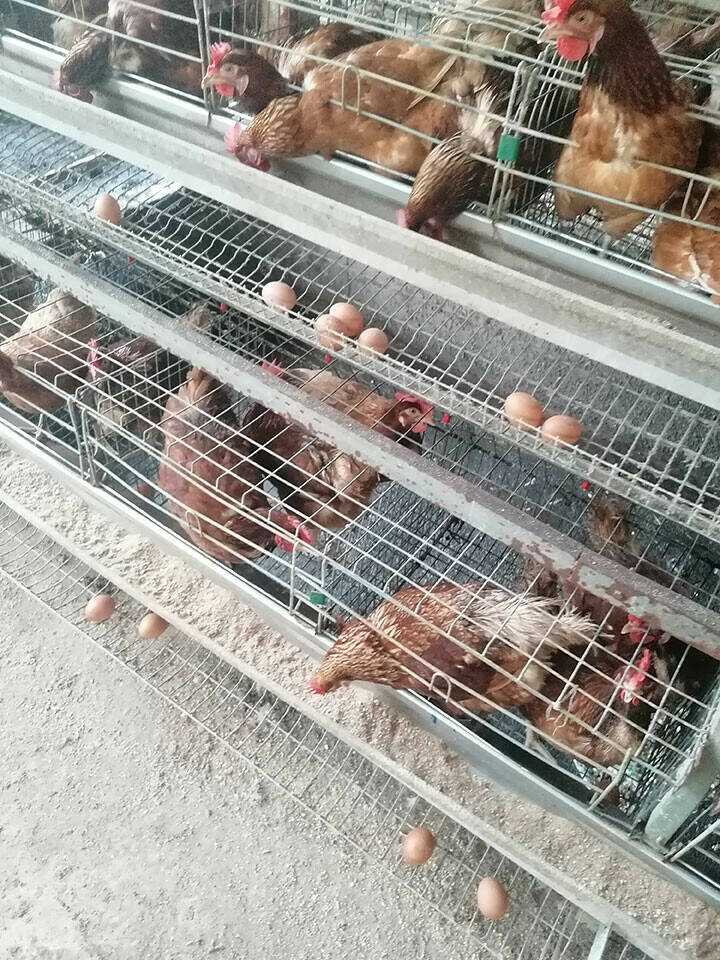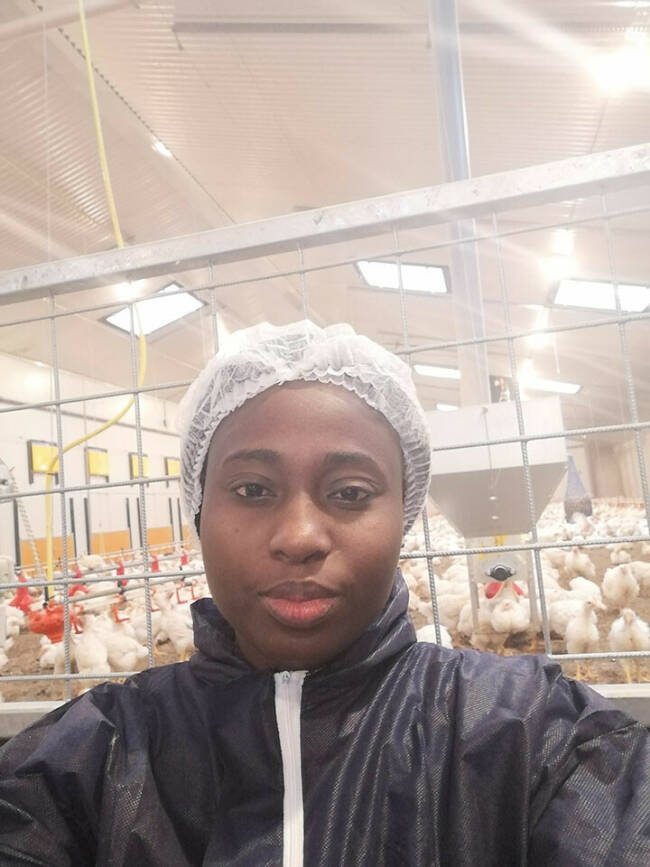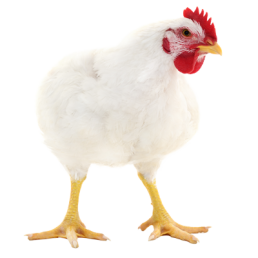
to run a successful poultry business
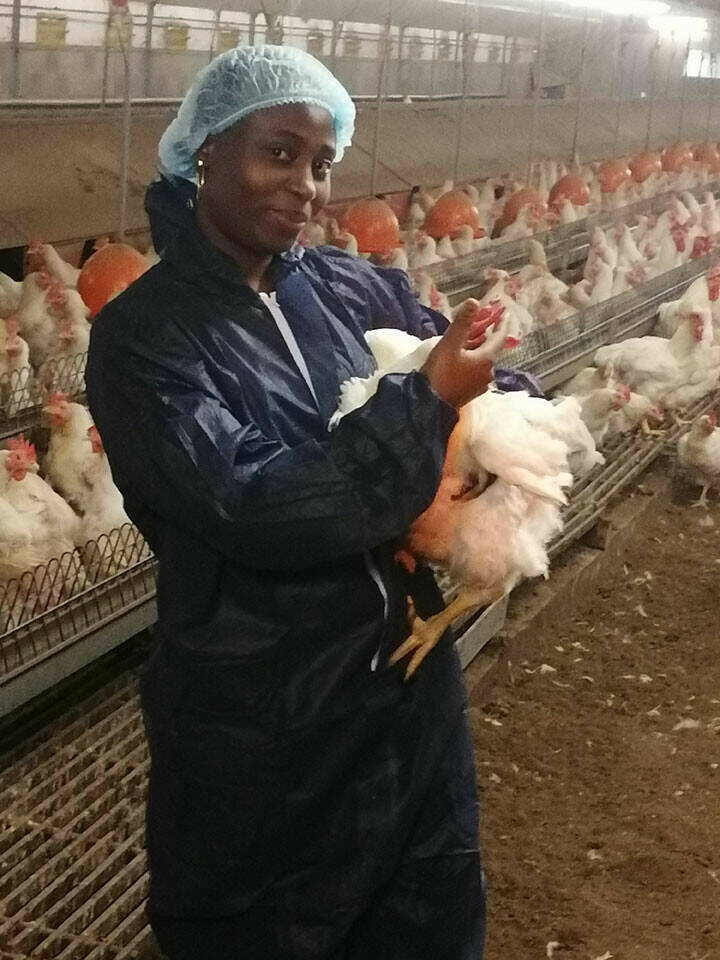

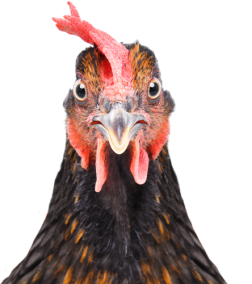
”
She met other Nigerians at ATCI, made it easier to find her place there.





While Opeyemi’s business has already changed a lot over the past years, she has still got hopes and dreams for the future. “My aspiration is to expand. I hope that over the course of time I will be able to own my own space, where I can work with other people. I believe it is a good thing where you have a business that you don’t solely own, but where investors are involved. Investors can help you grow and expand.”
Personal development and further education are also a part of Opeyemi’s future plans. “I hope I will be able to do more trainings. The world is never slowing down, new things are always happening, and technology is always evolving. It is good to educate yourself and to challenge yourself to keep learning new things”, she claims. “Given the chance, I would love to go back to ATCI. I enjoyed my training there and I wish to return for more!”
Opeyemi is a successful businesswoman in a sector that is dominated by men. That does not hold her back at all. “Not only this sector, but most of them in Nigeria are male dominated. But women are there, and we are doing good. Times are definitely changing!”
The training taught Opeyemi how to successfully run her business and helped her to improve things such as her record keeping, the economics of the business and how to make the company thrive. Not only does she benefit from that herself, but she has also been able to pass on the knowledge she had gained to others. “I invited farmers to train them in my own little way. Sometimes I even get asked to come and share my knowledge with them. Or they come to me as a sounding board, to see if they’re on the right path. Some people feel like poultry is just a hobby, something you can do to pass time. But the views on that are changing. More and more, people see poultry as a business. As it should be. They see it as something that they can make their living from.”
Opeyemi became a member of the Poultry Association in Nigeria. “That offered me the opportunity to meet with other organisations and people in this specific work field. They organise trainings from time to time, and I have been able to attend those and share my views and skills with others. Currently, I am also the secretary of the Nigerian poultry organisation in my state.”
Opeyemi explains that all those activities are voluntarily, but that she enjoys doing it and that she feels like it is a privilege to be able to contribute to a better poultry sector in her country.
During her training Opeyemi wrote a so-called Back Home Improvement Plan. This helps students to think of ways to implement what they have learned in their business back home to elevate it to a higher level.
“The training gave me a lot of insights on things I could change to improve my business”, Opeyemi explains. “It helped me to know when to stock, how to plan the production a year-round. I am able to understand the biology of my birds. I can now see when something is wrong and more importantly, what I need to do to fix it. I understand more of safety and security and have also improved that.”
Opeyemi hoped to learn from her training how to successfully run a farm. She gained a lot of insights on that, but in order to do so, one thing is key if you ask her. “Consistency. If you ask me, it takes consistency to run any business, including poultry. When running a business there are a lot of things that can discourage you. It takes a lot of discipline, but in the end both discipline and consistency are what will make your business thrive.”
In September 2018 Opeyemi left her business and family behind, for what was supposed to be a 9-month period of training. “It was my very first time away from my family and outside of Nigeria for such a long period of time. It wasn’t always easy, but after a little while I started to feel more and more at home in The Netherlands”, Opeyemi explains how she made friends, visited a lot of places and how all those experiences made it a very interesting time. The fact that she met other Nigerians at ATCI, made it easier to find her place there. “While I was supposed to be there for nine months, I unfortunately had to leave after about six months. This was due to the Covid outbreak. So, we finished up the training online.”
Though her time in the Netherlands was cut short, Opeyemi found it a unique and valuable experience. “We visited a couple of farms, which was very interesting. If I had to compare the way they work, to what we do in Nigeria, there was a lot more structure. Also, high-tech developments really impressed me. One farmer showed us that through cameras and monitoring systems he was completely able to manage the farm online. He always had insights in the farm, even if he was not on site. That really impressed me.”
Opeyemi learned valuable lessons during the training at ATCI. “There were several modules. The one on farm management really stood out for me. I was able to learn more about how to manage my farm. I gained a lot more knowledge on the business part of it all. For example, management, record keeping, calculations and those sorts of things. I learned how to see if I am making profit and how to write a business plan. All those things, I have been using to improve my business back home.”
Opeyemi did not only face problems that were specific to her business, but there are also typical challenges that come with working and living in a country such as Nigeria, that you would not find in a country like The Netherlands. “We deal with a certain risk of natural disaster”, Opeyemi explains. “And the weather does not help at all. We are in a place with a climate that is a lot warmer than in the Netherlands for example. Birds don’t really thrive in such high temperatures. And our poultry houses are not comparable to the ones in the Netherlands. We don’t have a closed off space that is climate controlled. On my farm we have open poultry houses. I run a small business, so I don’t have a big, high-tech poultry house. When the temperature gets too high, we try to cool down the animals manually. There are bigger companies in the country that do have closed houses and air-conditioning, but for me that is not an option right now. I would need to expand and scale up to be able to realise that.” Opeyemi has plans for her business in the future, but she believes it is better to gradually improve than to rush things. “You can’t jump from one point to another. You need support and you need to gradually work up from your current situation.”
Financial support is an important topic. It is however not regularly provided by the government, even though the farms are government owned sometimes. She does feel like there is support in terms of information and communication. “Recently, and by that, I mean last year November, we had some bird flu cases in Nigeria. Then we experienced some support. No reimbursements, but we got a lot of information. For example, on how to check our birds for symptoms and how to improve our security and prevention. When it comes to financial funding, there are some people who have gotten that, but most of the business have not received support in that form.”
In Nigeria, farmers often work in so-called cooperatives. The farm is owned by the government and people work in teams or cooperatives on this farm. That is also the way Opeyemi runs her poultry business. “I have a team of people around me, who I work with. Over the years, people come, and people go. That experience exposed me to learning more about the business side of it all. In 2018 a friend told me about the trainings at ATCI. I applied for the poultry training. It exposed me to things I hadn’t been able to see from inside the situation I was in. I got more insights on our challenges for example”, she explains. She illustrates that with some examples of the challenges her business was facing. “We did not have a very high production and we were dealing with health issues and diseases. I also gained insight in our management practices and realised that there were some challenges in those as well.”
Owning a poultry business was not always the plan Opeyemi had in mind. “My study at university had nothing to do with poultry. I was very much into plants, and I have a postgraduate in public health. After getting my degree, I wanted to go into an agricultural business. I was interested in plants and growing vegetables. While I was waiting for things to fall into place, I followed a training on agribusiness. During that training I learned about all sorts of things, but also found myself exposed to poultry farming for the first time. I did internships on poultry and learned more about it. I also learned more about crops, fish and other things but for some reason poultry spiked the most interest in me. The business opportunities for poultry seemed very positive. You don’t need as much space and land as you would need for crops for example. So, I decided that was what I wanted to do, and I started to work on the business plans.”
Opeyemi Balogun owns a poultry business in Nigeria. In 2018 she left her home country to study in Barneveld. She shares her experiences at Aeres Training Centre International (ATCI) and explains how she applied the lessons she learned there, when she came back home.

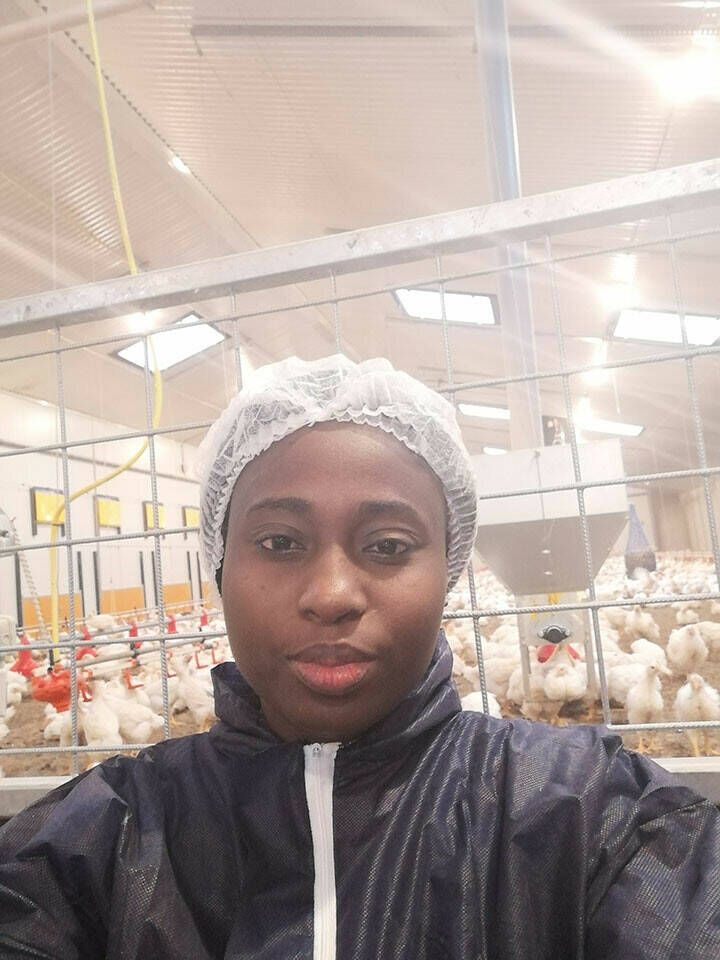
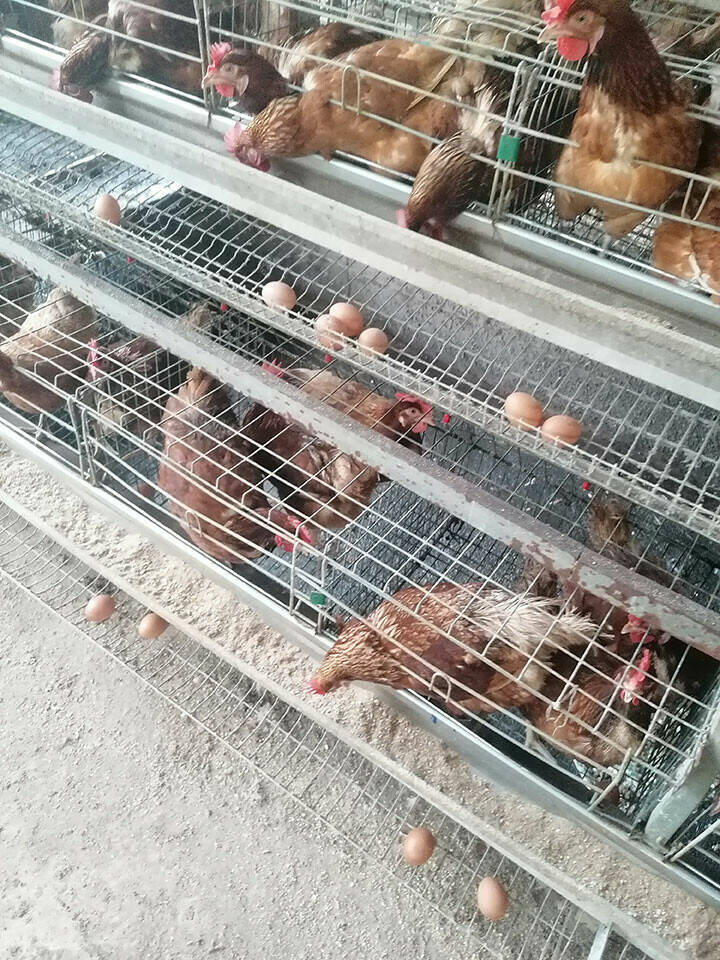

to run a successful poultry business
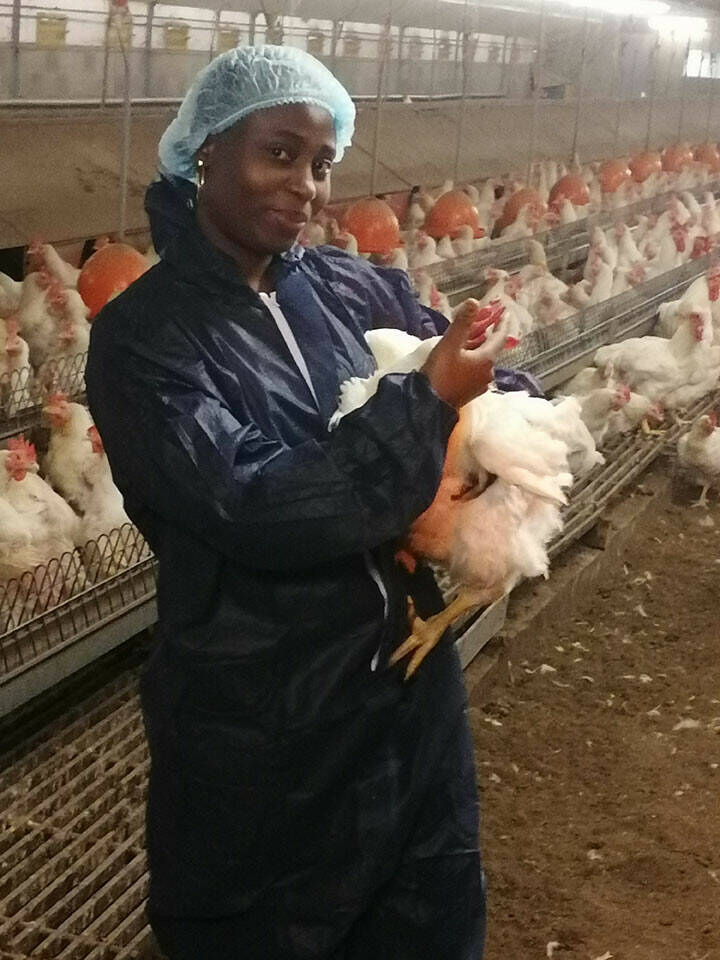
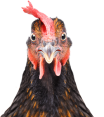






”
She met other Nigerians at ATCI, made it easier to find her place there.
While Opeyemi’s business has already changed a lot over the past years, she has still got hopes and dreams for the future. “My aspiration is to expand. I hope that over the course of time I will be able to own my own space, where I can work with other people. I believe it is a good thing where you have a business that you don’t solely own, but where investors are involved. Investors can help you grow and expand.”
Personal development and further education are also a part of Opeyemi’s future plans. “I hope I will be able to do more trainings. The world is never slowing down, new things are always happening, and technology is always evolving. It is good to educate yourself and to challenge yourself to keep learning new things”, she claims. “Given the chance, I would love to go back to ATCI. I enjoyed my training there and I wish to return for more!”
Opeyemi is a successful businesswoman in a sector that is dominated by men. That does not hold her back at all. “Not only this sector, but most of them in Nigeria are male dominated. But women are there, and we are doing good. Times are definitely changing!”
The training taught Opeyemi how to successfully run her business and helped her to improve things such as her record keeping, the economics of the business and how to make the company thrive. Not only does she benefit from that herself, but she has also been able to pass on the knowledge she had gained to others. “I invited farmers to train them in my own little way. Sometimes I even get asked to come and share my knowledge with them. Or they come to me as a sounding board, to see if they’re on the right path. Some people feel like poultry is just a hobby, something you can do to pass time. But the views on that are changing. More and more, people see poultry as a business. As it should be. They see it as something that they can make their living from.”
Opeyemi became a member of the Poultry Association in Nigeria. “That offered me the opportunity to meet with other organisations and people in this specific work field. They organise trainings from time to time, and I have been able to attend those and share my views and skills with others. Currently, I am also the secretary of the Nigerian poultry organisation in my state.”
Opeyemi explains that all those activities are voluntarily, but that she enjoys doing it and that she feels like it is a privilege to be able to contribute to a better poultry sector in her country.
During her training Opeyemi wrote a so-called Back Home Improvement Plan. This helps students to think of ways to implement what they have learned in their business back home to elevate it to a higher level.
“The training gave me a lot of insights on things I could change to improve my business”, Opeyemi explains. “It helped me to know when to stock, how to plan the production a year-round. I am able to understand the biology of my birds. I can now see when something is wrong and more importantly, what I need to do to fix it. I understand more of safety and security and have also improved that.”
Opeyemi hoped to learn from her training how to successfully run a farm. She gained a lot of insights on that, but in order to do so, one thing is key if you ask her. “Consistency. If you ask me, it takes consistency to run any business, including poultry. When running a business there are a lot of things that can discourage you. It takes a lot of discipline, but in the end both discipline and consistency are what will make your business thrive.”
In September 2018 Opeyemi left her business and family behind, for what was supposed to be a 9-month period of training. “It was my very first time away from my family and outside of Nigeria for such a long period of time. It wasn’t always easy, but after a little while I started to feel more and more at home in The Netherlands”, Opeyemi explains how she made friends, visited a lot of places and how all those experiences made it a very interesting time. The fact that she met other Nigerians at ATCI, made it easier to find her place there. “While I was supposed to be there for nine months, I unfortunately had to leave after about six months. This was due to the Covid outbreak. So, we finished up the training online.”
Though her time in the Netherlands was cut short, Opeyemi found it a unique and valuable experience. “We visited a couple of farms, which was very interesting. If I had to compare the way they work, to what we do in Nigeria, there was a lot more structure. Also, high-tech developments really impressed me. One farmer showed us that through cameras and monitoring systems he was completely able to manage the farm online. He always had insights in the farm, even if he was not on site. That really impressed me.”
Opeyemi learned valuable lessons during the training at ATCI. “There were several modules. The one on farm management really stood out for me. I was able to learn more about how to manage my farm. I gained a lot more knowledge on the business part of it all. For example, management, record keeping, calculations and those sorts of things. I learned how to see if I am making profit and how to write a business plan. All those things, I have been using to improve my business back home.”
Opeyemi did not only face problems that were specific to her business, but there are also typical challenges that come with working and living in a country such as Nigeria, that you would not find in a country like The Netherlands. “We deal with a certain risk of natural disaster”, Opeyemi explains. “And the weather does not help at all. We are in a place with a climate that is a lot warmer than in the Netherlands for example. Birds don’t really thrive in such high temperatures. And our poultry houses are not comparable to the ones in the Netherlands. We don’t have a closed off space that is climate controlled. On my farm we have open poultry houses. I run a small business, so I don’t have a big, high-tech poultry house. When the temperature gets too high, we try to cool down the animals manually. There are bigger companies in the country that do have closed houses and air-conditioning, but for me that is not an option right now. I would need to expand and scale up to be able to realise that.” Opeyemi has plans for her business in the future, but she believes it is better to gradually improve than to rush things. “You can’t jump from one point to another. You need support and you need to gradually work up from your current situation.”
Financial support is an important topic. It is however not regularly provided by the government, even though the farms are government owned sometimes. She does feel like there is support in terms of information and communication. “Recently, and by that, I mean last year November, we had some bird flu cases in Nigeria. Then we experienced some support. No reimbursements, but we got a lot of information. For example, on how to check our birds for symptoms and how to improve our security and prevention. When it comes to financial funding, there are some people who have gotten that, but most of the business have not received support in that form.”
In Nigeria, farmers often work in so-called cooperatives. The farm is owned by the government and people work in teams or cooperatives on this farm. That is also the way Opeyemi runs her poultry business. “I have a team of people around me, who I work with. Over the years, people come, and people go. That experience exposed me to learning more about the business side of it all. In 2018 a friend told me about the trainings at ATCI. I applied for the poultry training. It exposed me to things I hadn’t been able to see from inside the situation I was in. I got more insights on our challenges for example”, she explains. She illustrates that with some examples of the challenges her business was facing. “We did not have a very high production and we were dealing with health issues and diseases. I also gained insight in our management practices and realised that there were some challenges in those as well.”
Opeyemi Balogun owns a poultry business in Nigeria. In 2018 she left her home country to study in Barneveld. She shares her experiences at Aeres Training Centre International (ATCI) and explains how she applied the lessons she learned there, when she came back home.

